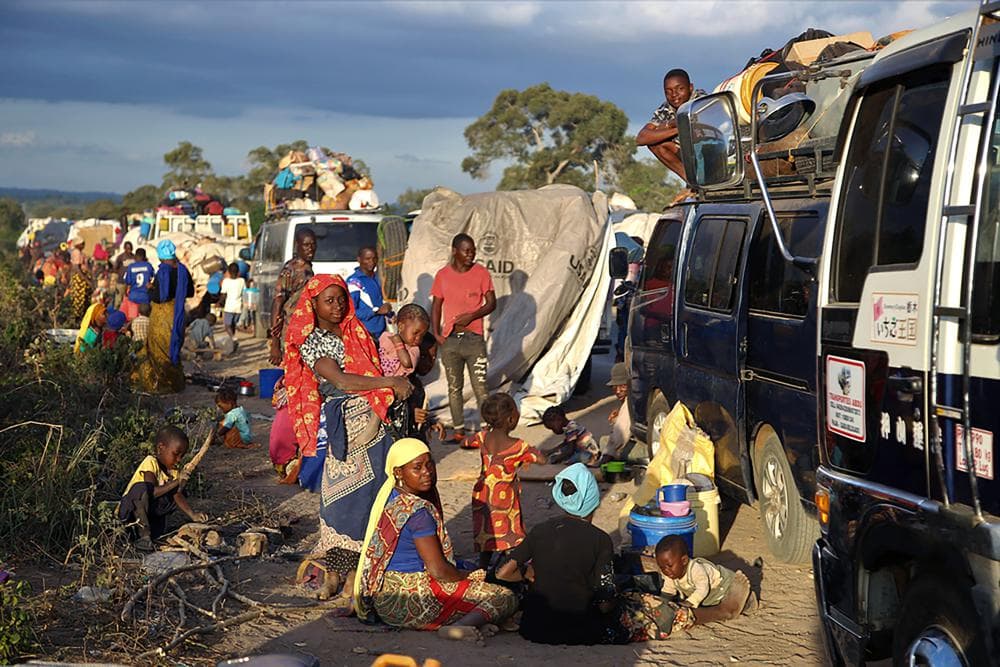YAOUNDÈ, Cameroon – Catholic observers are warning that in the war-torn Cabo Delgado region of Mozambique, women in camps and settlements for internally displaced persons are increadingly turning to prostitution just to be able to eat.
“In other parts of Mozambique prostitution is conducted on the streets and in entertainment venues, like elsewhere in the world,” said Johan Viljoen, Director of Catholic charity foundation, Denis Hurley Peace Institute of the South Africa Bishops’ Conference.
Prostitution is legal in Mozambique, a southeastern African nation of 33 million and one of the world’s poorest countries, despite a boom in gas and minerals.
“In this particular case, it is conducted in IDP camps and settlements, in exchange for food or other forms of humanitarian assistance, in other words not openly in public for all to see,” Viljoen told Crux.
For five years now, the Cabo Delgado region in the northeastern part of Mozambique has been faced with an armed insurgency, with attacks often claimed by the extremist Islamic State. The violence has led to the deaths of at least 4000 people and more than one million displaced persons, according to the United Nations High Commissioner for Refugees (UNHCR.)
With limited funding, the World Food Program has suspended food aid to people displaced by terrorist attacks and their host communities in northern Mozambique. Observers say the resulting shortages have taken a horrible toll on women and girls, who, battered by poverty, are now forced into prostitution.
According to the Center for Public Integrity (CIP), a journalistic foundation, among the affected women are girls between 12 and 17 years old
“A significant number of displaced women and girls in Cabo Delgado province use the sale of sex as a survival strategy,” said researcher Aldemiro Bande of the CIP.
Pervasive poverty is part of what’s driving women into prostitution in that part of the country.
Viljoen’s peace institute recently issued a report that concluded “43 percent of the Mozambican population lives in absolute poverty, and the country is the 7th poorest in the world.”
Johan Viljoen explained to Crux that “even before the war, the situation was desperate. Mozambique’s HDI (Human Development Index) value for 2019 … positions it at 181 out of 189 countries and territories. The HDI in Cabo Delgado is 0.391 – the lowest in Mozambique, and one of the lowest in the world.”
“The war has dramatically exacerbated the situation, with internally displaced persons losing even the little they had. In one place we visited in December 2019 we were told that between seven and ten people are buried every week who died of starvation. In another place we saw women cutting grass at the side of the road, to take home and boil to feed their families.”
With that crushing poverty, combined with scarce food distribution at settlements for IDPs, observes say that women aren’t just turning into prostitutes, but reluctant women are being forced into the practice by those who are supposed to protect them.
Bande’s CIP has accused heads of reception centers for IDPs of taking advantage of the food shortages to force vulnerable girls and women into sex. He notes “this is a phenomenon on which the Attorney General’s Office itself has already spoken. On the ground, what we found is that this still prevails.”
“There’s a lot of fear when we approach them, when we interview them,” Bande said. “The women have shown that they are very afraid to report these cases for fear of reprisals and being deprived of food assistance.”
The deprivations have also been seen as a way of putting pressure on the displaced to return to Cabo Delgado, as the government seeks to convince oil and mineral companies that had fled the insecurity to return.
Mozambican President Philipe Nyusi has implied that the region is already sufficiently stable for investments to restart, noting that “the working environment and security in northern Mozambique” make it possible for TotalEnergies, the global oil giant, “to resume its activities any time.”
Viljoen told Crux that such an assessment was wrong, insisting that the situation remains precarious.
“The clearest indication would be when internally displaced persons [voluntarily] return to their places of origin,” he said.
“There has been great pressure from the Mozambican state to get IDPs to return, anxious as they are for Total to resume operations,” Viljoen said. “At first civil servants were forced to return. Then IDP’s were given the assurance that all was safe, and that they should return.”
“In December, the UN and WFP ceased all humanitarian assistance in IDP camps, citing a lack of funds. IDPs saw this as a means of pressurizing them to return. Large numbers did, fearing starvation if they stayed in the settlements without food. Many have since returned to the settlements, saying that the conditions in Cabo Delgado were bad.”
There have been ongoing attacks in Cabo Delgado, suggesting the insurgency is far from over. Local bishops have consistently been saying that it is not yet safe to return, contradicting what the government and military spokespersons have said.
“The bishops have been vindicated,” Vijoen told Crux.














